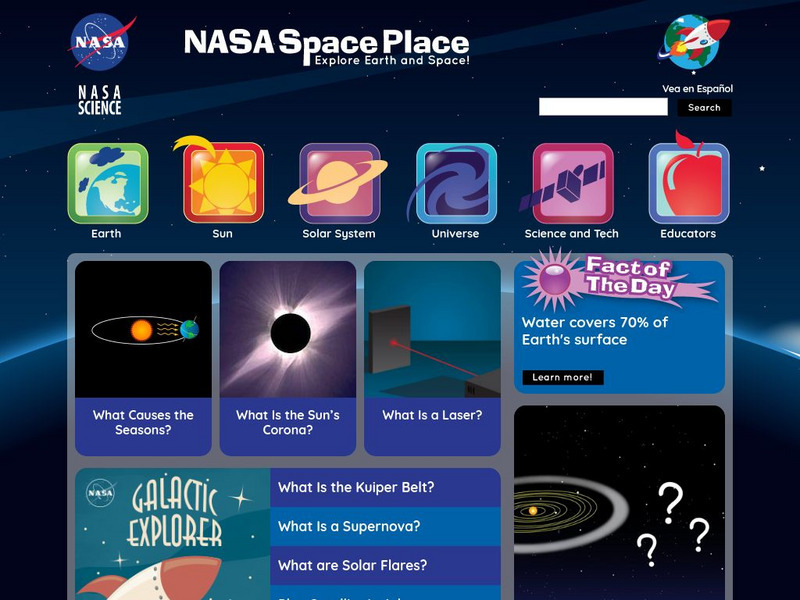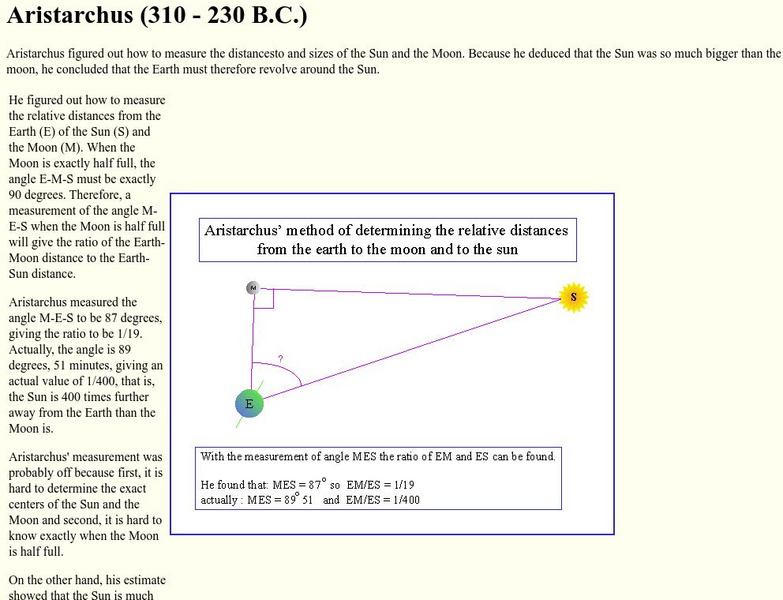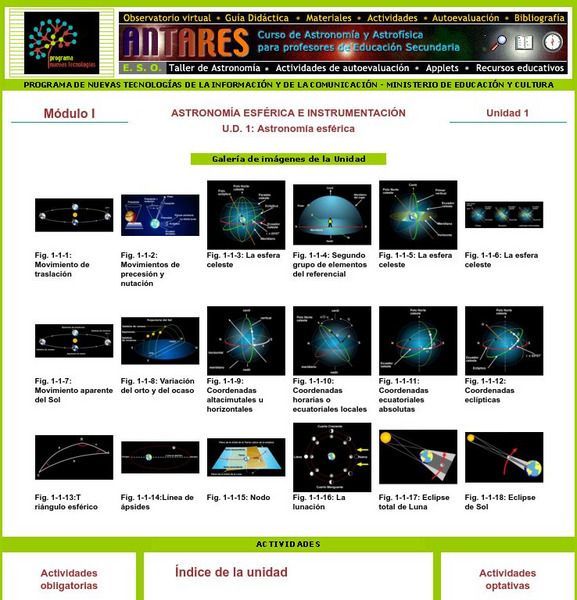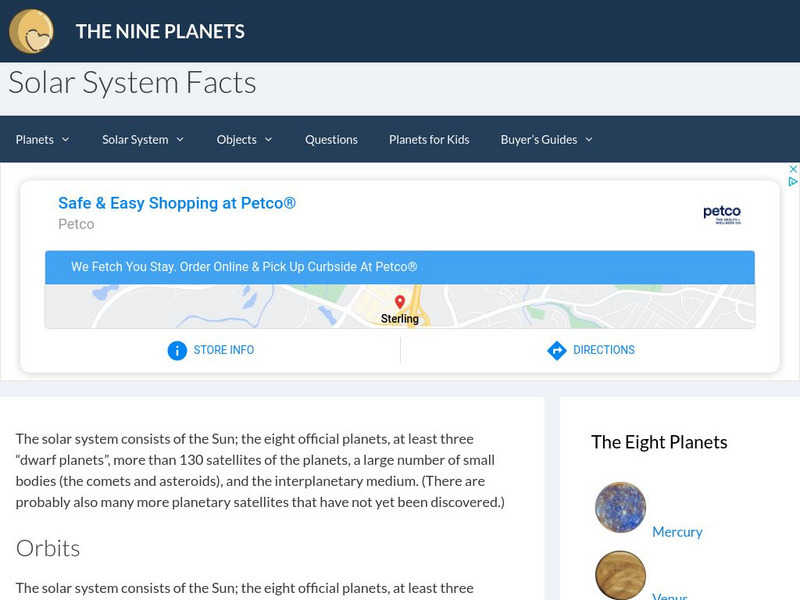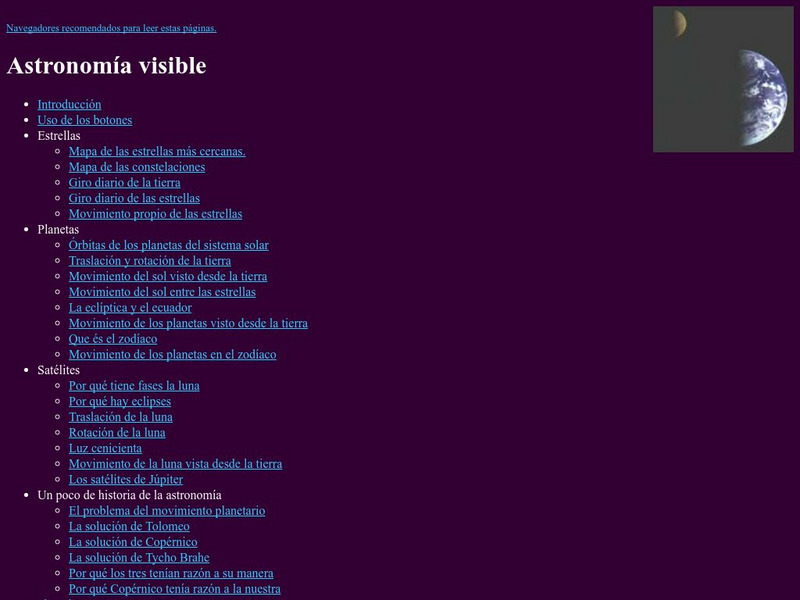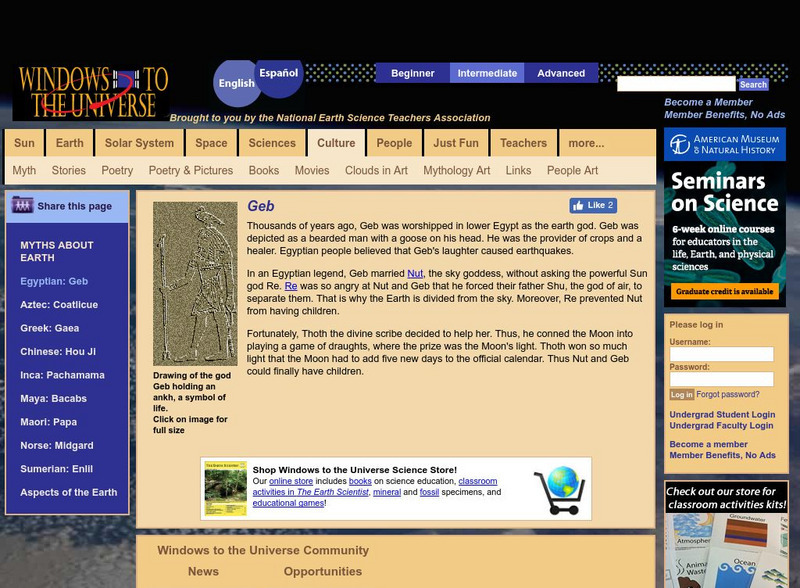Hi, what do you want to do?
PBS
Pbs: The Conquistadors: Growth of the Inca Empire
Find out about the incredible and widespread Inca Empire. You can read about the geography of the empire, the religion, governmental structure, record-keeping system, and diet. Be sure to click on the hyperlinks or pictures to get even...
NASA
Nasa: The Space Place
This site from NASA's Space Place is geared towards early elementary learners. It offers detailed instructions for crafts and activities related to space, games and a teacher resource area. Students can also ask an expert at this site.
Cornell University
Cornell University: Astronomy: Aristarchus
This site from Cornell University provides a discussion of how Aristarchus arrived at his conclusions of the distance from the Earth to the Sun and Moon. Also has his methods for determining the size of the Moon and the Sun.
Utah Education Network
Uen: Patterned Paragraphs
Students will learn about the importance of including specific details when writing. Students will watch the teacher model "How to Make a Peanut Butter Sandwich." Then student will replicate the process for writing with specificity as...
Other
Joseph Bruchac Home Page: Joseph Bruchac
This site is Joseph Bruchac's homepage. It provides links to his biography, a listing of his major works, and other online resources for the author. It also provides links to several of his poems to open or download on mp3.
NC State University
Adventures of the Agronauts
Come along with the Agronauts and discover space in order to report back to Commander Spud Goodroot. Fun site provides all types of information about space science! Various missions include: 'What's In Our Sky?', 'The Root of the...
Ministerio de Educación (Spain)
Ministerio De Educacion: Atronomia Esferica Modulo I Unidad 1
Recognize the major constellations and learn about the sky during the different seasons of the year. You will also be able to measure the height of the mountains of the moon.
Nine Planets
The Nine Planets: An Overview of the Solar System
A detailed overview of the history, mythology, and current scientific knowledge of each of the planets and moons in the solar system.
Nine Planets
The Eight Planets: Just for Kids
Here is a clear, simple picture of the solar system. Click on the names of the planets to learn more about each. Clicking on underlined terms takes you to more and more detailed scientific information.
Ministerio de Educación (Spain)
Ministerio De Educacion: Astronomia Visible
This site has maps of the nearest stars and constellations. Earth and star daily rotation, proper motion of the stars and many other topics about the solar system are also shown.Read phonetically
NASA
Nasa Star Child: Star Child
StarChild from NASA defines and describes the Solar System in a simple and easy-to-understand manner. The website is broken down into two versions for the student, grade school and junior high.
Other
Ellinogermaniki Agogi: Eratosthenes Experiment
A profile of the ancient Greek mathematician, geographer, and astronomer, Eratosthenes. Looks at his many accomplishments, including measuring the circumference of the Earth and the distance to the Moon and the Sun. Includes links to...
Text Project
Text Project: Fyi for Kids: The Tides [Pdf]
This FYI for Kids (Volume 5, Issue 3) focuses on the tides. It explains the pull on the earth by the sun and moon and how the tides go in and out.
Khan Academy
Khan Academy: How Our Solar System Formed
An article describing how the sun, planets, moons, and beyond Pluto was formed. Learn more about the beginning of our solar system.
National Earth Science Teachers Association
Windows to the Universe: Geb
This article outlines the ancient Egyptian myth in which Geb, the Earth god, and Nut, the sky goddess, marry without the approval of the powerful Sun god, Re.
Cornell University
Cornell University: Astronomy: Eclipses
This site from the Astronomy Department of Cornell University provides brief introduction to both solar and lunar eclipses. Links are provided for pictures and charts of the eclipses, and this is a good site to check out on the subject.
Curated OER
Exploratorium: Your Weight on Other Worlds
Want to lose weight in a hurry? Just step on a scale on almost any other planet! This page allows you to enter your weight on Earth and it will calculate your weight on all of the other planets, some moons and even some stars. Requires a...
Curated OER
Cornell University: Aristarchus
This site from Cornell University provides a discussion of how Aristarchus arrived at his conclusions of the distance from the earth to the sun and moon. Also has his methods for determining the size of the moon and the sun.
Curated OER
Cornell University: Aristarchus
This site from Cornell University provides a discussion of how Aristarchus arrived at his conclusions of the distance from the earth to the sun and moon. Also has his methods for determining the size of the moon and the sun.
Read Works
Read Works: What's Up in Space?
[Free Registration/Login Required] An informational text about outer space. A question sheet is available to help students build skills in reading comprehension.
Varsity Tutors
Varsity Tutors: Web English Teacher: Ray Bradbury
Explore the world of Ray Bradbury when you visit this educational resource. Each work is hyperlinked to study guide questions.
Other
All (Known) Bodies in Our Solar System Larger Than 200 Miles in Diameter
How big is the Earth compared to the Sun? Is Mars bigger than the Moon? Seeing all bodies in the solar system larger than 200 miles in diameter side by side provides an excellent comparison and an interesting perspective.
Other popular searches
- Earth Sun and Moon
- Earth, Sun and Moon
- Earth and Moon and Sun
- Sun, Earth and Moon
- Earth, Moon, and Sun
- Moon Earth and Sun Rotations
- Earth, Sun, and Moon






